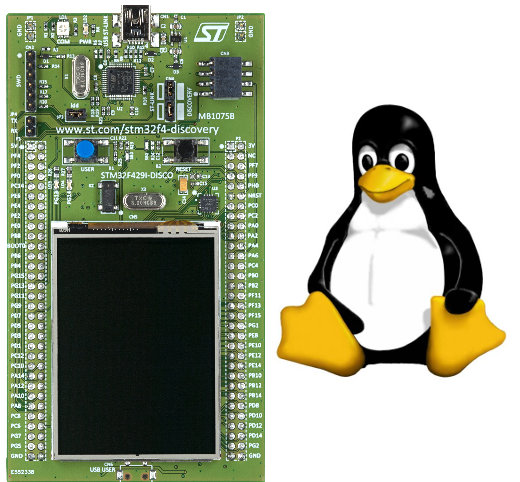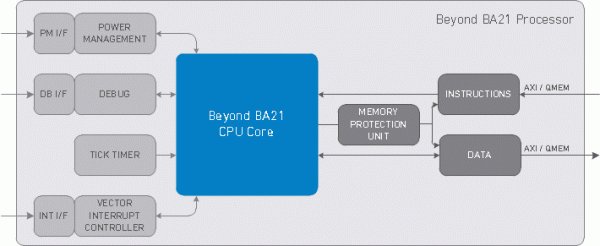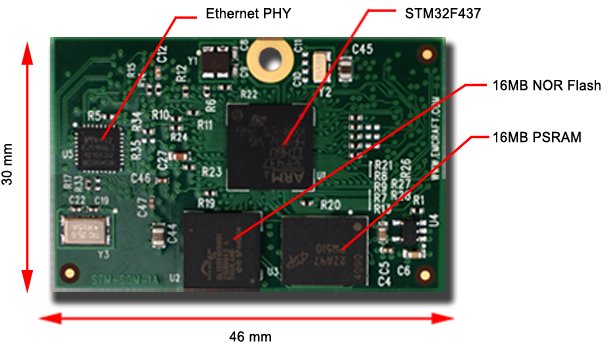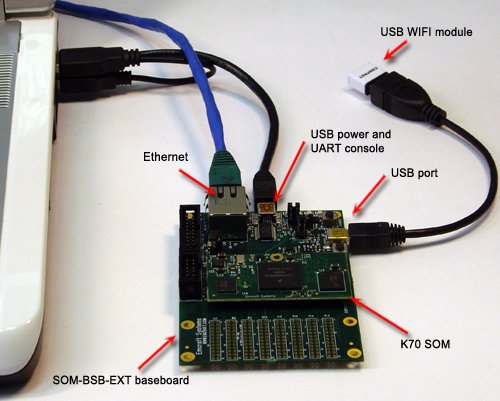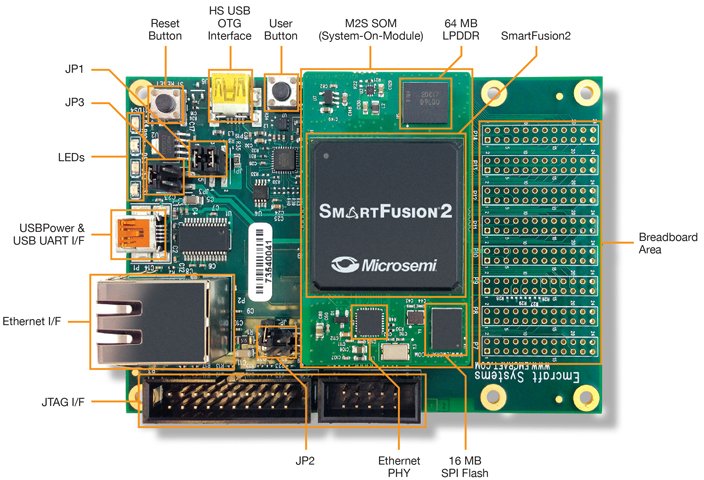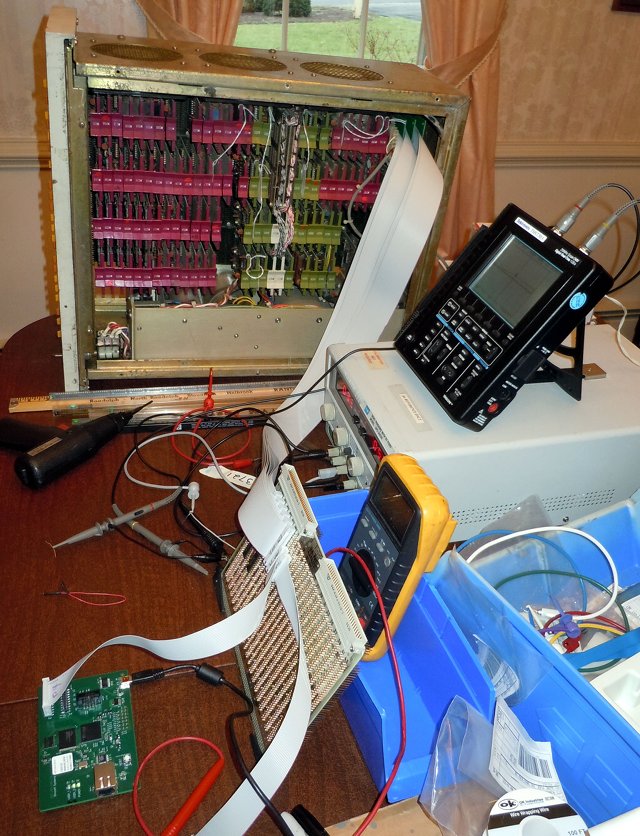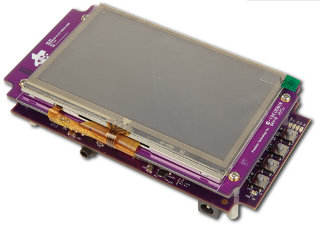If you want to run Linux on STM32 Discovery board, more exactly STM32F429 Discovery board, it’s now possible thanks to Emcraft Systems’ BSP for STM32F429 Discovery Board. It will only work on that particular version of the discovery board as it features 64Mbit external SDRAM, which is required for uClinux, and missing on other STM32 Discovery boards. You can either get u-boot and (uC)Linux from the company’s github account which contains the required patches, but lacks complete documentation, and a default config file for the kernel for example, or purchase a BSP ($33) with 3-month support, and pre-built u-boot and Linux binaries. There’s also publicly available documentation explaining how to flash the bootloader and the kernel among other things, and links to relevant external resources, without the need to spend any money. Jean-Luc Aufranc (CNXSoft)Jean-Luc started CNX Software in 2010 as a part-time endeavor, before quitting his job as a […]
Embedded Linux Conference Europe 2013 Schedule – Build Systems, Security, Device Tree, Debugging & Profiling Techniques, and More
Embedded Linux Conference Europe 2013 will conveniently start right after LinuxCon 2013, last 2 days (October 23-24), and take place at the same location: the Edinburgh International Conference Center, Edinburgh, United Kingdom. The Linux Foundation has published the schedule for the conference, so I’ll make my own virtual schedule with sessions that I find particularly interesting. Thursday – 24th of October 9:30 – 10:10 – Timeline For Embedded Linux by Chris Simmonds, Consultant, 2net Limited Today, Linux is woven into the fabric of our technology. Things such as printers, routers, TVs and phones all have their own “Inner Penguin”. Yet it was never originally intended to be used beyond desktop and server PCs. A lot of things had to happen before Linux could break out of the PC environment and make its way in the world as a jobbing jack-of-all-trades. Since the early beginnings of embedded Linux in the late 1990’s many people have contributed […]
Beyond Semiconductor Announces BA21 Processor Core for Embedded MCUs
Beyond Semiconductor, a Ljubljana, Slovenia based company, has recently announced BA21, a 32-bit processor core, with 2.5 Coremark per megahertz, and clocked up to 125 MHz, that’s roughly equivalent to a Cortex M3 core @ 120 MHz. Target applications include mixed signal embedded processing, wireless communications ICs (e.g. Bluetooth, Zigbee, GPS), industrial Microcontrollers, and battery-powered or ultra-low-cost devices.If you’ve never heard about Beyond Semi, you may want to read my previous article about their BA25 core (Cortex A7/A8 equivalent) for a bit more details about the company. Here are the key features of BA21 core: 32-bit Processor Small silicon footprint (less than 10k gates) for lower leakage and dynamic CPU power Two-stage pipeline architecture Extreme Code Density for lower instruction fetching energy Advanced power management Dynamic clock gating and power shut-off of unused units Software- and hardware-controlled clock frequency Wake-up on tick timer or external interrupt Performance Up to 2.5 […]
Emcraft Systems STM32F4 SoM and Starter Kit Run uCLinux From On-Chip Flash
Emcraft has recently announced a new system-on-module based on STMicro STM32F437 Cortex M4 micro-controller, as well as a starter kit based on the module that can run uCLinux directly from STM32F437’s 2MB on-chip flash, allowing a faster boot time, and AFAIK, this is the only Linux-ready STM32 platform available on the market. Here are the specifications of Emcraft Systems SOM-STM32F4: MCU – STMicro STM32F437 Cortex M4 @ 168 MHz with 256KB RAM and 2MB flash External Memory – 16MB PSRAM External Storage – 16MB NOR Flash Ethernet PHY (Optional) Connectors – 2x SoM Connectors with access to I/Os: USB, Ethernet, I2C, SPI, UART, LCD I/F, ADC, DAC, GPIO… Dimensions – 30 mm x 46 mm To speed-up development and for evaluation, the company also provides a starter kit composed of the STM32F4 SoM, and a baseboard (SOM-BSB-EXT) with the following main features: USB interface using USB-UART bridge connected to UART […]
Adding Wi-Fi to Emcraft Systems K70 SoM
Emcraft Systems K70 SoM is a system-on-module powered by Freescale K70 Cortex M4 micro-controller with enough RAM (64 MB) to comfortably run uClinux. They used to charge $99 for their uCLinux BSP, but it’s now free of charge, and the company also provides full hardware and software documentation, including a getting started guide, schematics and BoM for the baseboard, application notes and more… Many of their clients want to use Wi-Fi with K70 SoM, and it can easily be done by using Wi-Fi USB dongles based on Ralink RT5370 chipset such as D-Link DWA-140 (H/W rev B3) or Comfast CF-WU815N. Emcraft has provided detailed instructions to do so with K70 SoM, their latest baseboard (SOM-BSB-EXT) and a demo image based on their uClinux BSP. I’ll summarize the instructions to use K70 SoM as a Wi-Fi access point below. Connect the baseboard and K70 SoM with an Ethernet cable, a mini […]
$299 Microsemi SmartFusion2 Starter Kit (Cortex M3 + FPGA)
Microsemi SmartFusion2 SoC family combines an ARM Cortex-M3 Core @ 166 Mhz and FPGA Fabric with up to 12M Gates, and comes with up to 512 KB eNVM and 64 KB eSRAM, 1 CAN A & B interface, 1 GbE port, 1 USB 2.0 OTG, and diverse serial interface. Last year I received Emcraft SmartFusion Starter Kit using the first generation of the starter kit, and Microsemi (previously known as Actel) and Emcraft Systems have recently announced the second generation with the SmartFusion2 Starter Kit. The main hardware features include: SmartFusion2 SoC FPGA in FG896 package (M2S050T-FG896ES) with 256KB eNVM, 64KB SRAM, and 48,672 logic modules. JTAG interface for programming of the SmartFusion2 device 10/100 Ethernet interface and RJ-45 connector USB OTG interface and mini-USB connector USB based Wi-Fi Module 64MB LPDDR, 16MB SPI flash User push-button connected to GPIO on the SOM Two user-controlled LEDs connected to GPIO on […]
Posibus Peripheral Emulator Powered by Emcraft SmartFusion (Cortex M3 + FPGA) Solutions
According to Wikipedia, Digital Equipment Corporation (DEC) PDP-8 was the first successful commercial minicomputer, and was introduced in March 1965. Mike Thompson, working at Rhode Island Computer Museum (RICM), has restored a PDP-8/L system that was sold between 1968 through 1971. The system can be expanded with 4K of core, a paper tape reader (PR8/L), and/or a punch (PP8/L) controller. But the tape reader is not available anymore, so Mike decided to designe a Posibus peripheral (Tape Reader) emulator using a board with an FPGA + micro-controller. The easiest way to perform this task was to get an SoC that comes with an MCU and a FPGA to avoid having to create an FPGA <-> MCU interface. This is why he chose Emcraft Linux SmartFusion Evaluation Kit featuring a Microsemi Smartfusion cSOC with a Cortex M3 core and an embedded FPGA. The whole setup is shown below. Three FlipChip interface boards […]
$66.75 Beaglebone and Other Development Boards Xmas Deals
I’ve come across Xmas deals for uCLinux, Linux and Android development boards & kits by Texas instruments and Emcraft Systems. TI offers 25% discount off five Sitara Linux/Android development kits purchased via Ti e-Store: AM3359 Industrial Development Kit – A full-featured application development platform for evaluating the capabilities and features of Sitara AM335x ARM Cortex-A8 Processors for industrial applications. AM335x processors integrate industrial communication standards that work on Ethernet, CAN, and RS-485 physical layers. Regular price: $895 AM335x Starter Kit – Low-cost development platform based on AM335x ARM Cortex-A8 processor with multiple communication options such as Dual Gigabit Ethernet, WiFi and Bluetooth connectivity, as well as a 4.3″ LCD Touchcreen (resistive). Regular price: $199 AM3359 Industrial Communications Engine (ICE) – Low cost development platform targeted for systems that specifically focus on the industrial communications capabilities of the Sitara AM335x ARM Cortex-A8 Processors. Regular price: $99 Beaglebone – Low-cost, community-supported development […]


